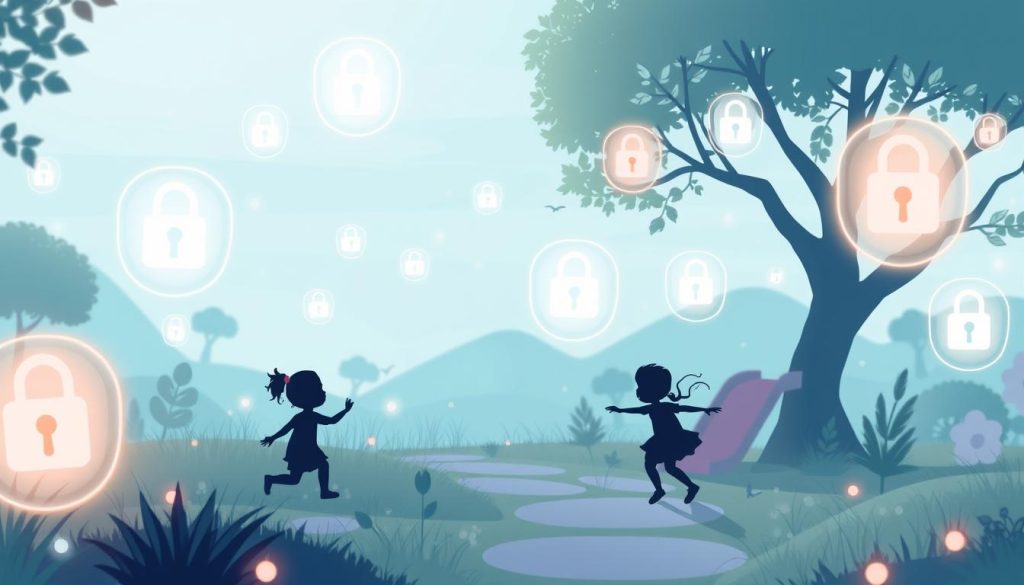Are you putting your child’s safety at risk every time you post their picture online?
“Sharenting,” or sharing kids’ photos on social media, is common today. Leah Plunkett from Harvard Law School warns that these digital footprints can harm your child’s privacy and safety.
More than 75% of parents share their kids’ photos online. But, only 24% always ask for permission first. This can lead to big risks like data breaches and misuse of personal info.
Research from the London School of Economics shows kids as young as four want to decide if their photos are shared. With Barclay’s predicting a rise in identity fraud from shared photos, it’s key to be mindful of what we share.
This article offers insights on sharing family moments responsibly. We’ll cover cybersecurity, preventing digital kidnapping, and more. Our goal is to help you enjoy sharing while keeping your child safe.
Key Takeaways
- 75% of parents share their children’s images online; only 24% ask for permission each time.
- Leah Plunkett’s research warns of risks like data breaches and identity theft from oversharing.
- Kids as young as four want to be consulted before their photos are shared, according to the London School of Economics.
- Barclay’s predicts two-thirds of identity fraud cases by 2030 could stem from parental photo sharing.
- 80% of parents have social media connections they’ve never met, enhancing the risk of unauthorized data access.
Understanding the Risks of Sharing Your Child’s Photos Online
Sharing your child’s photos on social media might seem okay, but it’s risky. It’s called sharenting when parents share a lot about their kids online. This makes things more dangerous than ever.

Cybersecurity Concerns
When you post your child’s info online, you invite big cybersecurity dangers. A 2015 study found 74% of parents sharing a lot about their kids online. This can lead to people finding out where your child is and what they do every day.
Also, kids’ photos can be used for facial recognition tech. Social media sites might use your photos and data without asking. This puts your child’s online safety at risk.
Preventing Identity Theft
Sharing your child’s photos online can lead to identity theft. Birth announcements and birthday posts give out important info like name and age. Research shows 51% of parents share where their kids are, making them easy targets.
Since kids don’t have credit yet, their Social Security numbers are tempting to hackers. This can hurt their financial future.
Protecting Against Stalking and Harassment
Sharing photos online can lead to stalking and bullying. Though rare, it can happen. Over 27% of parents share photos they shouldn’t, not thinking about the risks. Predators can track your child’s activities, which is very dangerous.
This behavior can also hurt your child’s mental health and self-esteem. It can affect their school and work life. Sharing too much can let others judge your child unfairly, affecting their freedom and story.
Knowing these risks helps you deal with parenting challenges in the digital world. It ensures your child stays safe online.
Setting Family Rules and Communicating Boundaries
Creating clear family rules is key to keeping your child’s online world safe. It’s important to have guidelines everyone agrees on. This helps protect your family and encourages talking openly.
Creating a Unified Approach with Co-Parents
When you’re divorced and have kids, working together with your co-parent is crucial. Talking clearly about online rules helps avoid confusion. It also strengthens your co-parenting bond.
Getting everyone involved in these talks helps avoid disagreements. It shows that everyone’s priorities are respected. This is especially important when dealing with stepchildren, ensuring everyone’s voice is heard.

Teaching Kids About Digital Consent
Teaching kids about consent is vital, starting early. It’s not just about their physical space but also their online presence. By learning about digital consent, kids understand the value of privacy.
Talking to them about what’s okay to share online is key. This teaches them respect and personal boundaries. It’s a strong foundation for their future.
Managing Extended Family and Friends’ Behavior
Dealing with extended family and friends can be tough. It’s important to tell them about your family’s online rules clearly. Setting boundaries before gatherings helps avoid conflicts.
Being firm but kind when enforcing these rules is crucial. It builds trust and respect in your family circle.
Studies show that even young kids can join these conversations. Explaining why we have rules helps them follow them. Setting consequences for breaking rules teaches them about self-respect. It’s important to address unhealthy patterns and keep everyone informed for a safe online space for your child.
Parenting Challenges: Balancing Sharing and Privacy
In today’s world, parents face the challenge of sharing their child’s life online while keeping their privacy. It’s important to know why we post and the effects it has. This knowledge helps us handle this tricky situation better.
Exploring Motivations Behind Posting
Parents share their kids’ big moments online to get praise and celebrate their growth. Research by Iwasa et al. (2023) shows that wanting approval can make us act differently online. Heitner stresses the need to focus on talking and understanding, not just sharing out of worry.

The Fine Line Between Sharing and Oversharing
Finding the right balance between sharing and too much is key. Parents, especially those with middle child syndrome, need to make sure all kids get attention. Talking openly, especially about puberty, helps kids feel safe and valued online.
Respecting Your Child’s Privacy and Consent
It’s vital to respect your child’s privacy and ask for their okay before sharing. Research shows that too much sharing can affect a child’s online identity and cause problems. Teaching kids about body positivity and giving them control over their images helps them value privacy. While sharing can bond us, it must be done carefully to keep trust and independence.
By understanding these challenges and aiming for a balanced approach, we can help both ourselves and our kids deal with the digital world’s complexities.
The Impact on Your Child’s Future
When you share your child’s life online, think about the lasting effects. Parenting today means dealing with a digital world. This world can shape your child’s future in many ways, from school to their career.
Research shows that 85% of children can lack independence if parents make all the choices. It’s key to find a balance in coaching children’s sports and teaching them to make their own decisions. Letting them face challenges on their own boosts their problem-solving and confidence.

Parental decisions about screen time are also crucial. Too much screen time can hurt their ability to make friends and interact well with others. These skills are vital for their social life and future relationships.
Also, digital exposure is linked to postpartum mental health. A parent’s mental health affects their ability to create a supportive environment for their child’s growth. It’s important to take care of your mental health for your child’s sake.
Using eco-friendly parenting strategies is another way to teach your child about responsibility. Teaching them about sustainability early on helps them grow into a mindful and capable person.
Remember, the memories you share online today will shape your child’s future. Thinking ahead about these actions helps you support their growth and independence.
Conclusion
Sharing moments of your child’s life online can be heartwarming. But, it’s crucial to protect their privacy. This keeps their identity safe and their digital footprint clean for the future.
Setting family rules and talking about what’s okay to share is key. This is especially true when dealing with sibling rivalry and anxiety. It helps create a safe space for emotional growth and privacy.
Modern parenting is about finding the right balance in online sharing. Knowing why and what you share is important. Gentle parenting teaches us to respect our child’s consent and privacy.
This approach helps avoid the risks of oversharing. It keeps your child’s well-being safe online.
Positive parenting strategies are great for your child’s emotional and social growth. Gentle parenting helps counter the digital age’s stress. It’s essential for managing sibling rivalry and anxiety.
It creates a safe and nurturing environment for your child’s digital journey. This ensures their online experiences are both safe and enriching.
Your efforts to protect your child’s online interactions show deep parental responsibility. As technology advances, being careful with sharing is more important than ever. It balances the joy of sharing with the need for privacy, making gentle parenting in our digital world effective.
FAQ
What are the key risks of sharing my child’s photos on social media?
How can I prevent identity theft when sharing my child’s information online?
What steps can I take to protect my child from stalking and harassment online?
How can co-parents create a unified approach to digital sharing?
What should I teach my children about digital consent?
How do I handle extended family and friends who may share my child’s photos without permission?
What are common motivations behind parents posting about their children on social media?
How do I find a balance between sharing and oversharing?
Why is it important to respect my child’s privacy and consent regarding online sharing?
How can digital footprints impact my child’s future?
This post contains affiliate links. If you click on a link and make a purchase, I may earn a small commission — at no extra cost to you. Thank you for supporting this blog and helping me keep the patterns free! Read the full Affiliate Disclosure & Transparency.
